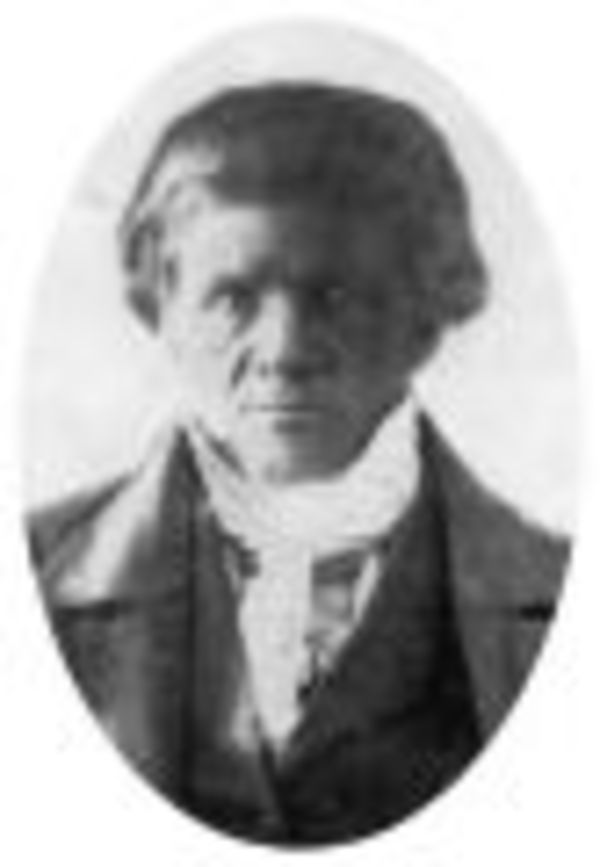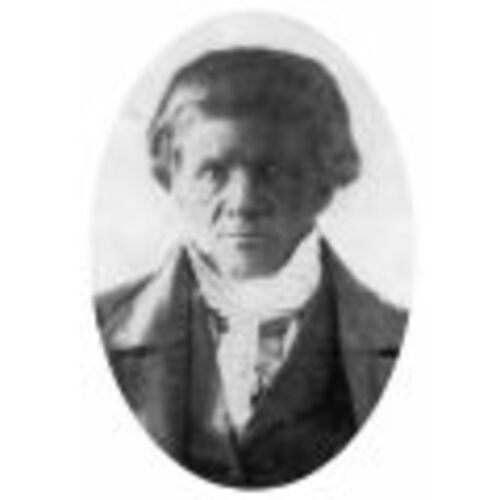
Source: Link
GAUKEL, FRIEDRICH (Frederick), farmer and businessman; b. 7 June 1785 in Württemberg (Federal Republic of Germany); m. first c. 1813 Polly Kaufman (d. 1827), and they had four sons and three daughters; m. secondly Maria Roschang (d. 1834 of cholera); m. thirdly Dorothea Weikmillar; d. 8 Nov. 1853 in Berlin (Kitchener), Upper Canada.
Friedrich Gaukel’s name appears among those of the German immigrants who arrived at Philadelphia from Holland aboard the Rebecca on 27 Aug. 1804. Along with other Württemberg natives, he may have been attracted to America by the publicity attending the exodus to Pennsylvania at this time of members of the charismatic sect led by the German lay preacher and weaver John George Rapp. According to a short biography published by Gaukel’s grandson Jacob Stroh, he served for his passage money as a redemptioner on a farm near Philadelphia. He continued farming after his release from the indenture and by 1815 lived near Johnstown, Pa.
About 1820 Gaukel, a Lutheran, heard of the Mennonite migration from Pennsylvania to Upper Canada and decided to move there. After a trip of four weeks he arrived with his family in Waterloo Township, where he worked in a distillery until he bought a small farm near Bridgeport (Kitchener) and began operating a distillery of his own. After 1826 increasing numbers of Germans arrived in the region directly from Europe and settled largely in four townships: Wilmot, Waterloo, Woolwich, and Wellesley. Thus when the settlement of Ebytown began to expand, Germans, as well as Mennonites, were prominent in its development as a commercial centre. On 2 Nov. 1833 Gaukel purchased property there from Joseph Schneider* and from Benjamin Eby and moved into the settlement. The deeds for these transactions are the first on record referring to the community as Berlin.
Gaukel operated a tavern while awaiting the completion of a larger building which would meet the demands of the growing village. A public-spirited member of the community, he subscribed to the establishment of Heinrich Wilhelm Peterson’s newspaper Canada Museum, und Allgemeine Zeitung in 1835, the year in which Gaukel’s Inn (later known as the Commercial Hotel) opened to the public. For many years Gaukel and his third wife, also a native of Württemberg, hosted, in addition to the inn’s daily commercial activities, various civic and political meetings, markets, and other public gatherings in this predominantly German-speaking community. The wide veranda of the inn was a favourite tribune for political candidates who addressed the citizenry assembled in the street.
In 1841 and 1846 Gaukel acquired additional property and as one of Berlin’s leading landowners he took an active interest in its municipal development. He donated the land on which Waterloo Township Hall was built in 1848–49. Together with his friend Joseph Schneider and other early citizens, he had campaigned for the organization of Waterloo County, which took place in 1850, and he was much involved in promoting Berlin’s selection as county seat in 1852. He provided land that year for the construction of a county court-house. In recognition of Gaukel’s contributions, a grateful community named two of its early streets after him.
AO, RG 22, ser.214, Friedrich Gaukel. Kitchener Public Library (Kitchener, Ont.), “Gaukel family notes” (typescript). PAC, RG 31, A1, 1851, Waterloo Township, pt.4: 178. Waterloo North Land Registry Office (Kitchener), Abstract index to deeds, Berlin (mfm. at AO, GS 2958); Waterloo Township (mfm. at AO, GS 3023, GS 3027). Der Deutsche Canadier (Berlin [Kitchener]), 10 Nov. 1853. R. B. Strassburger, Pennsylvania German pioneers: a publication of the original lists of arrivals in the port of Philadelphia from 1727 to 1808, ed. W. J. Hinke (3v., Norristown, Pa., 1934), 3: 147. Gottlieb Leibbrandt, Little paradise: the saga of the German Canadians of Waterloo County, Ontario, 1800–1975 (Kitchener, 1980), 36, 38–51. Bill Moyer, Kitchener: yesterday revisited; an illustrated history (Burlington, Ont., 1979), 19–21, 27. W. V. Uttley, A history of Kitchener, Ontario (Kitchener, 1937; repr. [Waterloo, Ont., 1975]), 35, 37–38, 40–41, 71, 80, 83, 85, 88. Jacob Stroh, “Frederick Gaukel,” Waterloo Hist. Soc., Annual report, 1928: 86–87; “Reminiscences of Berlin (now Kitchener),” Waterloo Hist. Soc., Annual report, 1930: 175–207; 1931: 274–84.
Cite This Article
Klaus Wust, “GAUKEL, FRIEDRICH (Frederick),” in Dictionary of Canadian Biography, vol. 8, University of Toronto/Université Laval, 2003–, accessed May 19, 2025, https://www.biographi.ca/en/bio/gaukel_friedrich_8E.html.
The citation above shows the format for footnotes and endnotes according to the Chicago manual of style (16th edition). Information to be used in other citation formats:
| Permalink: | https://www.biographi.ca/en/bio/gaukel_friedrich_8E.html |
| Author of Article: | Klaus Wust |
| Title of Article: | GAUKEL, FRIEDRICH (Frederick) |
| Publication Name: | Dictionary of Canadian Biography, vol. 8 |
| Publisher: | University of Toronto/Université Laval |
| Year of revision: | 1985 |
| Access Date: | May 19, 2025 |



